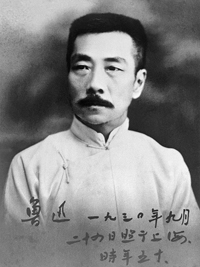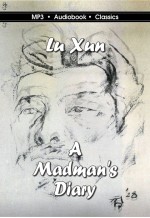Lu Xun
| Lu Xun is the pen name of Zhou Shuren (September 25, 1881 – October 19, 1936), a Chinese writer who was a leading figure in modern Chinese literature. He was born into a once prosperous family whose fortunes declined during his youth, which forced him to attend government-funded schools instead of pursuing the imperial civil service exam typical of his class. He attended medical school in Japan on scholarship but dropped out and returned to China due to lack of funds. During this time his earliest essays and his translations of influential Western novels were published. In 1906 he consented to an arranged marriage to an illiterate woman who he supported financially but physically abandoned. He worked as a teacher in secondary schools and colleges before finding a position at the Republic of China Ministry of Education. Publication of “A Madman’s Diary” in New Youth magazine in 1918 was met with praise and recognition as a leading figure in the New Culture Movement. Lu was a candidate for the 1927 Nobel Prize in Literature, but he rejected the nomination. At about this time, he renounced writing fiction in response to the deteriorating political situation in China, restricting himself to writing essays. Mao Zedong was a lifelong fan of his work, calling him “the saint of modern China”. He was acclaimed by the Chinese government after the establishment of the People’s Republic of China in 1949. While sympathetic to socialist causes, he never joined the Communist Party of China. Lu Xun was a heavy smoker and eventually developed chronic tuberculosis. He died from respiratory failure in Shanghai on October 18, 1936. |
A Madman's Diary
“A Madman’s Diary” is a short story by Lu Xun first published in 1918. Written in vernacular Chine..
$7.99


